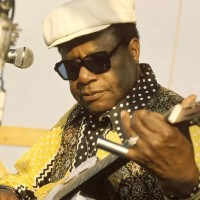Home » Jazz Musicians » Bukka White
Bukka White
Booker T. Washington “Bukka” White was another of the original Bluesmen to come out of Mississippi, living the life they sang about. He benefited from a resurgence of interest in his music and was able to enjoy firsthand the Blues Revival, performing and recording until his death in 1977. Born on a farm near Houston, Mississippi, November 12, 1909, and named for the famed black educator, Bukka White was interested in music from an early age. His father taught him guitar at the age of nine, and a chance meeting with Charley Patton convinced the young White to "come to be a great man like Charley Patton." The son of a railroad worker, White was exposed to the sound of trains from an early age and was not afraid to hobo a train. He rode the rails from the Mississippi Delta to St. Louis, where he played poolrooms, barrelhouses, and parties for food and tips during the 1910s and 1920s. During a 1930 stay in Memphis, White recorded fourteen songs, including three gospel numbers with Memphis Minnie supplying background vocals. Two 78s were released from the session, one containing two gospel sides and the other containing two blues numbers. Neither met with commercial success, but during this session White received the designation "Bukka" from a white record producer who had never heard of his famous namesake Booker T. Washington. He continued to travel during the 1930s, working as a professional boxer in Chicago and as a Negro League pitcher with the Birmingham Black Cats. During the summer of 1937, White shot an assailant in the thigh and was sentenced to Parchman Farm. Before beginning his sentence, he recorded two blues for the Vocalion label, including "Shake 'Em On Down," which sold in excess of 16,000 copies. Bluesman Big Bill Broonzy recorded "New Shake 'Em On Down," and scored another hit on that theme while White toiled at Parchman. Making the best of a bad situation, he recorded for folklorist Alan Lomax in 1939, while the latter was at the notorious prison recording for the Library of Congress. Upon his release from prison in 1940, White traveled to Chicago for a follow-up session to "Shake 'Em On Down." The resulting twelve songs transcend blues as music, becoming powerful ruminations on imprisonment, isolation, loneliness, Jim Crow justice, and the freedom of the rails. White's post-Parchman success was short-lived, however, as a stint in the U.S.
Read moreTags
Photos
Music
Recordings: As Leader | As Sideperson


























